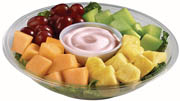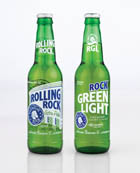
Fruit Salad Days
The 2005 edition of the Dietary Guidelines for Americans recommended two cups of fruit per day, based on a 2,000-calorie diet, and fast-food restaurants are jumping at the chance to help consumers fill that requirement. In the process, they are creating a major upsurge in the fruit and vegetable market.Wendy's (Dublin, Ohio) now offers a fruit bowl and cup, offering fresh cantaloupe, honeydew melon and pineapple chunks, red seedless grapes and a low-fat, strawberry-flavored yogurt as a dip. The bowl fulfills the daily recommendation, while the cup gives half the amount.
Similarly, McDonald's (Oak Brook, Ill.) has launched Apple Dippers, 10 or so peeled apple slices packed with a caramel dip. With the launch, the company became the nation's number-one apple-buying restaurant chain--virtually overnight. Combined with a forthcoming apple salad, McDonald's may wield too much control, some growers fear. The concern is that the presence of such powerful chains could alter the method and scale of production, as well as the varieties of apples produced.

Enduring Traits
Since its debut in the 1960s, Gatorade (PepsiCo, Purchase, N.Y.) has led the sports drink market but, to be fair, the powerhouse faced little competition until Coca-Cola (Atlanta) launched Powerade. While still a distant second to Gatorade's 80% market share, the Coke brand commands a respectable 17% and is rising. In fact, outside the U.S., Coke is the leading sports drink company, powered by the Powerade and Aquarius brands. For that matter, Powerade is strong on the domestic fountain front.Is Gatorade feeling the heat? PepsiCo poured $141.6 million into marketing the drink last year, compared with the $11.2 million spent by Coke, which plans to increase Powerade's marketing budget by a double-digit percentage this year. Now, PepsiCo is trying something really new.
While past Gatorade introductions have focused on new flavors, Gatorade Endurance Formula is a new beverage that boasts twice the sodium and triple the potassium of its namesake; the new version aims to help athletes more easily replace fluids and electrolytes.
Seeing Green
Rolling Rock (InBev USA, Norwalk, Conn.) is set to launch its first-ever umbrella marketing campaign, with a joint promotion of the brand's low-calorie and low-carbohydrate versions.At the same time, the Rock Green Light version will get an updated look. The new appearance follows a similar theme as its Rolling Rock sibling. Namely, it features brand icons like the painted green bottle, horse head, sawblade and distinctive typeface, but Rock Green Light also boasts its “fit-conscious” lifestyle benefits--83 calories and 2.4g of carbs.
Low-calorie beers continue to be a key component driving double-digit sales growth for the light-beer category, according to ACNielsen (New York).

Sidebar
General Mills' (Minneapolis) Total and Wheaties brands are well-known among consumers. They should be. After all, they have been around for over 40 and 80 years, respectively, but thanks to a partnership with Leiner Health Products (Carson, Calif.), they have a new home among dietary supplements.The concept is not entirely new. It follows on the heels of similar moves by such diverse companies as Procter & Gamble (Cincinnati) and Prevention magazine (Rodale Inc., Emmaus, Pa.), but General Mills regards its dual-pronged move as a “natural extension of the health promise of these brands.”
It is curious to note that each brand is targeting a similar demographic. Wheaties hopes to attract active adults aged 25 to 44 with 100% or more of 17 vitamins and minerals, plus coenzyme Q10. Total, meanwhile, is for the over-35 crowd looking to maintain a healthy lifestyle and to improve their energy, eye and cardiovascular health and bones. Total boasts 24 vitamins and minerals, as well as lutein, lycopene and extra B vitamins.